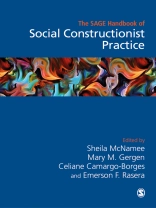The SAGE Handbook of Social Constructionist Practice is the first major survey of innovations in professional practice emerging from a social constructionist orientation to social science. This key perspective has been unique in its stimulation of pioneering practices over a broad number of professions. This volume offers insights into the latest developments in theory, showcases the range and variations in practical outcomes, while pointing to emerging directions of development. The Handbook focuses on hands-on practices, while offering the theoretical tools for further enriching their application. The authors are leading figures in their fields, including organizational development, therapy, healthcare, education, research, and community building. The volume will be particularly useful for students, scholars, professional practitioners, and change makers from across the globe.
PART ONE: Introduction
PART TWO: Research Practices
PART THREE: Practices in Therapeutic Professions
PART FOUR: Practices in Organizational Development
PART FIVE: Practices in Education
PART SIX: Practices in Healthcare
PART SEVEN: Community Practices
Tabla de materias
Editors′ Introduction – Sheila Mc Namee, Mary Gergen, Celiane Camargo-Borges, & Emerson F. Rasera
Part 1: Introduction
Chapter 1: Constructionist Theory and the Blossoming of Practice – Kenneth J. Gergen
Part 2: Research Practices
Chapter 2: Introduction to Research Section – Mary Gergen
Chapter 3: Research as Innovation: An Invitation to Creative and Imaginative Inquiry Processes – Celiane Camargo Borges & Sheila Mc Namee
Chapter 4: Collaborative Action Research: Co-constructing Social Change for the Common Good – Ottar Ness & Dina von Heimburg
Chapter 5: Action Research and Social Constructionism: Community of Inquiry/Practice – Hilary Bradbury
Chapter 6: Research as Performative Inquiry – Mary Gergen
Chapter 7: We Are All Researchers – Sally St. George & Dan Wulff
Chapter 8: To Know and Not to Know: Dialogic Social Inquiry – Rocio Chaveste & ML Papusa Molina
Chapter 9: Transmaterial Worlding as Inquiry – Gail Simon & Leah Salter
Chapter 10: Researching Socio-material Practices: Inquiries into the Human/non-human Interweave – Tanya Mudry & Tom Strong
Part 3: Practices in Therapeutic Professions
Chapter 11: Curiosity and Generativity: Welcome to Practices in the Therapeutic Professions – Sally St. George & Dan Wulff
Chapter 12: Social Construction and Social Work Practice – Stanley L. Witkin & Christopher Hall
Chapter 13: Collaborative-Dialogic Practice: A Relational Process of Inviting Generativity and Possibilities – Harlene Anderson
Chapter 14: Generative Dialogues: Creating Resources and Possibilities in Therapy – Dora Fried Schnitman
Chapter 15: How Symbolic Witnesses Can Help Counter Dominant Stories and Enrich Communities of Concern – Jasmina Sermijn
Chapter 16: Contributions of Social Constructionism to Group Work – Emerson F. Rasera & Carla Guanaes-Lorenzi
Chapter 17: Constructing Social Therapeutics – Lois Holzman
Chapter 18: Integrative Community Therapy: Creating a Communitarian Context of Generative and Transformative Conversations – Marilene Grandesso
Chapter 19: Individuals in Competition of Communities in Connection? Narrative Therapy in the Era of Neoliberalism – Jill Freedman & Gene Combs
Chapter 20: Post-Truth and a Justification for Therapeutic Initiative – Karl Tomm
Part 4: Practices in Organizational Development
Chapter 21: When Social Constructionism Joins the Organization Development Conversation – Diana Whitney
Chapter 22: Relational Ethics in Organizational Life – Gitte Haslebo
Chapter 23: Working with Relational Leading and Meaning Making in Teams of Leaders – Lone Hersted
Chapter 24: Coaching: Using Ordinary Words in Extraordinary Ways – Haesun Moon
Chapter 25: Relational Practices for Generative Multi-Actor Collaboration – Johan Hovelynck, Marc Craps, Art Dewulf, Koen Sips, Tharsi Taillier, & Rene Bouwen
Chapter 26: Designing Relationally Responsive Organizations – Ginny Belden-Charles, Morgan Mann Willis, & Jenny Lee
Chapter 27: Large Scale Appreciative Inquiry: New Futures through Shared Conversations – Amanda Trosten-Bloom & Barbara Lewis
Chapter 28: Zooming in on the Micro-Dynamics of Social Innovation: Enabling Novelty through Relational Constructionist Practice – Danielle Zandee
Chapter 29: Social Construction and the Practice of Dialogic Organization Development – Gervase Bushe & Robert Marshak
Part 5: Practices in Education
Chapter 30: Education as Relational Process and Practice: Introduction – Thalia Dragonas
Chapter 31: Lifescaping: Cultivating Flourishing School Cultures – Rolla Lewis
Chapter 32: Creating School Harmony – Gro Emmertsen Lund
Chapter 33: Creating New Futures through Collaboration: Dropouts No More – Ingebjorg Maeland
Chapter 34: Collaborative, Appreciative, and Experiential Pedagogy in Educational Settings – Dawn Dole
Chapter 35: School Counseling – Michael Williams & John Winslade
Chapter 36: Relief of Critical Educational Psychology and the Nomadism of Critical Disability Studies: Social Constructionism in Practice – Tom Billington & Dan Goodley
Chapter 37: Specific Learning Difficulties as a Relational Category: Reconstruction, Redistribution and Resistance in Higher Educational Practice – Harriet Cameron
Chapter 38: Intercultural Education: Empowering Minority Learners – Thalia Dragonas
Chapter 39: Educational Evaluation: A Relational Perspective – Scherto Gill & Kenneth Gergen
Part 6: Practices in Healthcare
Chapter 40: Political, Collaborative and Creative: Dimensions of Social Constructionist Health Care Practices – Murilo S. Moscheta
Chapter 41: Collaborative Re-construction of Health Care – Ellen Raboin & Paul N. Uhlig
Chapter 42: Words Matter: Promoting Relationality in Healthcare through Narrative Medicine – Karen Gold
Chapter 43: Strengthening Our Stories in the Second Half of Life: Narrative Resilience through Narrative Care – William Randall
Chapter 44: From an Individualist to a Relational Model of Grief – Lorraine Hedtke
Chapter 45: Changing the Conversation: Appreciative Inquiry and Appreciative Practices in Healthcare – Natalie May, Julie Haizlip, & Margaret Plews-Ogan
Chapter 46: Populating Recovery: Mobilizing Relational Sources for Healing Addiction – Pavel Nepustil
Chapter 47: Health Care Practices for LGBT People – Murilo S. Moscheta & Emerson F. Rasera
Chapter 48: Mindfulness as a Generative Resource in Compassionate Health – Edgardo Morales
Chapter 49: Toward Relational Engagement: Poetic Reflections in Care – Arlene Katz & Kathleen Clark with Elizabeth Jameson
Chapter 50: Play Creates Well-being: The Contingency and the Creativity of Human Interation – Saliha Bava
Part 7: Community Practices
Chapter 51: Community Building from a Social Constructionist Lens – Marie L. Hoskins
Chapter 52: Narrative Mediation – John Winslade & Gerald Monk
Chapter 53: Inclusion and Community Building: Profoundly Particular – Janet Newbury
Chapter 54: Placemaking, Social Construction, and the Global South – Celiane Camargo-Borges & Cesar Ferragi
Chapter 55: Re-imagining the Welfare State: From Systems Delivery to Collaborative Relationship – Jacob Storch & Carsten Hornstrop
Chapter 56: Transformative Community Conferencing – A Constructionist Approach to a More Hopeful Future – David Hooker
Chapter 57: Relational Community Practices for Transitional Societies – Victoria Lugo
Chapter 58: Knowing Ourselves in the Stories of Us: The Inclusive Practice of ‘Be-Longing’ – Ilene C. Wasserman & Erin W. Taylor
Chapter 59: Intergenerative Community Building: Intergenerational Relationship for Co-creating Flourishing Futures – Kristin Bodiford & Peter Whitehouse
Chapter 60: Social Construction, Practical Theology, and the Practices of Religious Communities – Duane R. Bidwell
Sobre el autor
Emerson F. Rasera, Ph.D. is Professor of Psychology at the Federal University of Uberlândia, Brazil. He is former President of the Brazilian Association of Social Psychology, and former Editor of the Brazilian journals Psicologia & Sociedade [Psychology & Society], and Gerais: Revista Interinstitucional de Psicologia [Gerais: Interinstitutional Journal of Psychology]. His work is focused on social constructionist contributions to psychological practices, especially in health care, community work, and issues of sexual diversity. His most recent books are The Sage Handbook of Social Constructionist Practice (with S. Mc Namee, M. Gergen, & C. Camargo-Borges, 2020), Grupo como construção social [Group as social construction] (with M. Japur, 2018) and Social Constructionist Perspectives on Group Work (2015).












